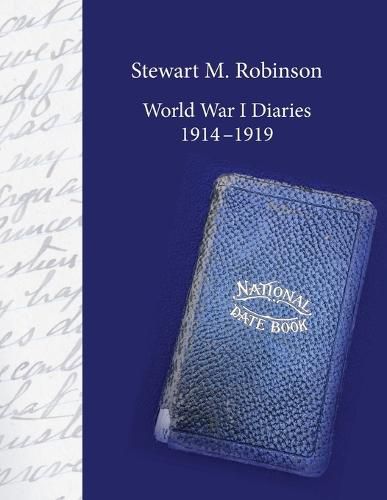Readings Newsletter
Become a Readings Member to make your shopping experience even easier.
Sign in or sign up for free!
You’re not far away from qualifying for FREE standard shipping within Australia
You’ve qualified for FREE standard shipping within Australia
The cart is loading…






This title is printed to order. This book may have been self-published. If so, we cannot guarantee the quality of the content. In the main most books will have gone through the editing process however some may not. We therefore suggest that you be aware of this before ordering this book. If in doubt check either the author or publisher’s details as we are unable to accept any returns unless they are faulty. Please contact us if you have any questions.
At the beginning of the Great War, Stewart MacMaster Robinson, then in college, began recording in a diary his views on the war and his calling to serve. This diary documents his application to the US Army Chaplain Corps, his training and commissioning as a US Army Chaplain at Camp Taylor, Louisville, KY. It tells how his troop ship avoided stalking U-boats, then once in France, his appointment as Division Chaplain for the 78th Division and its combat burial officer. It depicts exposure to ghastly trauma and his survival that would mark his life for decades. A postscript describes his service as Chairman of the Armed Forces Chaplain Commission after World War II and during the Korean war. This war diary, illustrated with period photos, demonstrates vividly how, despite dangers in combat, human sorrow, countless burials, and the dread of war, faith in familial love and belief in God kept him centered on the important aspects of life. The diary is also a tender, long-distance love story as he pined for his beloved new bride back home. However, sadly alone, she was to suffer the miscarriage of twin boys at the peak of the Great Influenza. He himself survived infection with "influenza" after medical evacuation from the battlefield that same week in late September 1918. Robinson records the horror he witnessed while comforting others who were suffering. He remained grounded in his faith in God and optimistic about being able to help others physically and spiritually.
$9.00 standard shipping within Australia
FREE standard shipping within Australia for orders over $100.00
Express & International shipping calculated at checkout
This title is printed to order. This book may have been self-published. If so, we cannot guarantee the quality of the content. In the main most books will have gone through the editing process however some may not. We therefore suggest that you be aware of this before ordering this book. If in doubt check either the author or publisher’s details as we are unable to accept any returns unless they are faulty. Please contact us if you have any questions.
At the beginning of the Great War, Stewart MacMaster Robinson, then in college, began recording in a diary his views on the war and his calling to serve. This diary documents his application to the US Army Chaplain Corps, his training and commissioning as a US Army Chaplain at Camp Taylor, Louisville, KY. It tells how his troop ship avoided stalking U-boats, then once in France, his appointment as Division Chaplain for the 78th Division and its combat burial officer. It depicts exposure to ghastly trauma and his survival that would mark his life for decades. A postscript describes his service as Chairman of the Armed Forces Chaplain Commission after World War II and during the Korean war. This war diary, illustrated with period photos, demonstrates vividly how, despite dangers in combat, human sorrow, countless burials, and the dread of war, faith in familial love and belief in God kept him centered on the important aspects of life. The diary is also a tender, long-distance love story as he pined for his beloved new bride back home. However, sadly alone, she was to suffer the miscarriage of twin boys at the peak of the Great Influenza. He himself survived infection with "influenza" after medical evacuation from the battlefield that same week in late September 1918. Robinson records the horror he witnessed while comforting others who were suffering. He remained grounded in his faith in God and optimistic about being able to help others physically and spiritually.